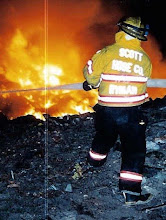Here in my area, just a generation ago,
but long enough for the statute of limitations to expire, a local fire chief
was reliably rumored to have taken a fire setter back behind the station and
administered an “attitude adjustment” to the offender which was probably more
painful than what the judge ultimately meted out. If our current crop of politicians believe
laws and punishment for arson are stringent today, they are not students of
history. The first such law in
Pennsylvania was passed in 1700, and stated “Whosover shall be convicted of
willfully firing another man’s house, warehouse, outhouse, barn, or stable,
shall forfeit his or her own estate to the party suffering, and be imprisoned
all their lives in the House of Correction at hard labor to the behoof of the
said party suffering.” Apparently life
with hard labor wasn’t a sufficient punishment as in 1718, the penalty was
increased to death, and in 1767, they took away the condemned’s access to a
clergyman before execution.
As tough as the old Pennsylvanians were,
they had nothing on the Babylonians in the days of Hammurabi, around 2000
BC. “If in a man’s house, a fire has
been kindled, and a man who has come to extinguish the fire has lifted up his
eyes to the property of the house, and has taken the property of the owner of
the house, that man shall be thrown into that fire.” In both Japan and early Edwardian England,
the older Babylonian concepts were continued; the penalty for incendiarism
being death by fire, a rather poetic form of justice.
While societal norms and our
jurisprudence have evolved over time, most can probably think of a few
incidents where we wouldn’t have minded taking a fire setter on a Marty McFly
time travel journey back to meet one the judges from these time periods. So if anyone knows where to find an old
DeLorean….






